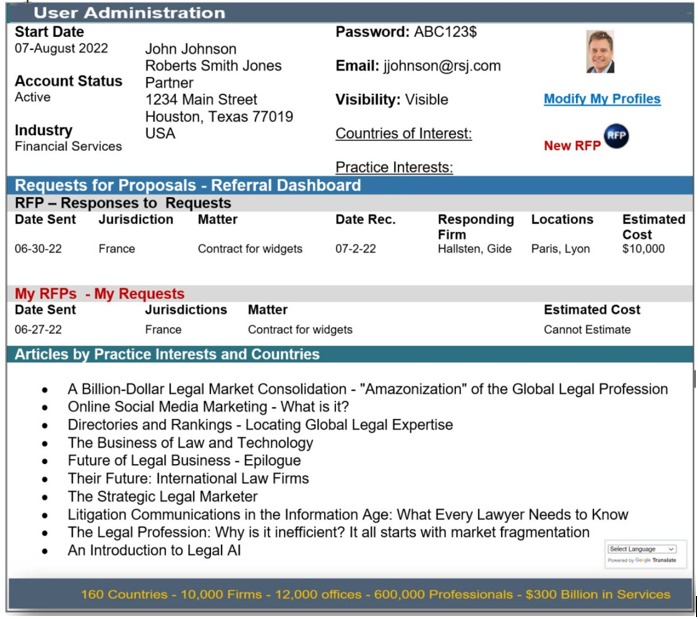Legal and Accounting Professions - How
do retail and wholesale market concepts relate to services such legal and accounting services where no firm has a large market share and services are
fragmented? How can AI address these issues?
To apply AI effectively to improve the level of service and increase
revenues in the fragmented legal services sector, we can leverage AI's
capabilities to address some of the key challenges and opportunities in this
market. Here’s how AI can enhance legal services:
Improving Level of Service
- Enhanced Client
Service:
- AI-Powered
Chatbots: Implement AI chatbots to provide instant responses to client
inquiries, schedule appointments, and handle routine queries, ensuring
clients receive timely assistance.
- Virtual Legal
Assistants: Use AI to assist lawyers in preparing documents, conducting
legal research, and managing case files, thereby improving efficiency and
accuracy.
- Personalized
Services:
- Client
Insights: Utilize AI to analyze client data and provide personalized
legal advice based on historical cases and client preferences.
- Tailored
Communication: AI can help in segmenting clients and personalizing
communications, ensuring that each client feels valued and understood.
- Efficient Case
Management:
- Document
Automation: AI can automate the creation of standard legal documents,
reducing the time spent on routine paperwork.
- Predictive
Analytics: Use AI to predict case outcomes based on historical data,
helping lawyers to strategize more effectively.
- Improved Access
to Legal Resources:
- Knowledge
Management Systems: Implement AI-driven knowledge management systems that
can quickly retrieve relevant case laws, statutes, and legal precedents,
aiding lawyers in their research.
Increasing Revenues
- Targeted
Marketing and Client Acquisition:
- Data-Driven
Marketing: Use AI to analyze market trends and client behavior, enabling
more targeted and effective marketing campaigns.
- Lead Scoring:
Implement AI to score potential leads and prioritize high-value clients,
improving conversion rates.
- Optimizing
Pricing Strategies:
- Dynamic
Pricing Models: Use AI to develop dynamic pricing models that can adjust
based on market demand, client history, and competitive analysis.
- Cost Analysis:
AI can help firms understand the cost structure better and identify areas
where efficiency can be improved, ultimately reducing costs and
increasing margins.
- New Service
Models:
- Online Legal
Services: Develop AI-driven online platforms that offer basic legal
services and consultations, expanding the firm’s reach to a broader
audience.
- Alternative
Legal Service Providers: Utilize AI to offer specialized services such as
contract review, compliance checks, and due diligence at a lower cost and
faster turnaround.
- Operational
Efficiency:
- Workflow
Automation: AI can automate various administrative tasks such as billing,
invoicing, and client follow-ups, reducing overhead costs.
- Resource
Allocation: AI can optimize resource allocation, ensuring that the right
tasks are assigned to the right personnel based on their expertise and
availability.
Addressing Fragmentation in the Legal
Market
- Building Specialized
AI Tools:
- Custom AI
Solutions: Develop AI tools tailored to specific areas of law, such as
intellectual property or criminal defense, to provide specialized and
highly efficient services.
- Localized AI
Services: Create AI solutions that are customized for local regulations
and practices, helping smaller firms to compete effectively in their
specific markets.
- Enhancing
Collaboration:
- AI-Driven
Collaboration Platforms: Implement platforms where smaller law firms can
collaborate, share resources, and access a collective knowledge base,
enhancing their ability to compete with larger firms.
- Maintaining
Quality and Ethics:
- Compliance and
Ethics Monitoring: Use AI to monitor compliance with legal standards and
ethical guidelines, ensuring that firms maintain high standards of
service.
- Client
Relationship Management:
- AI-Powered CRM
Systems: Deploy AI in client relationship management systems to track
client interactions, preferences, and history, enabling firms to build
stronger, trust-based relationships.
By leveraging AI in these ways, legal firms can enhance their service levels, streamline operations, and explore new revenue streams, all while maintaining the high standards of personalization and expertise that are crucial in the fragmented legal market.





 Software
Software Law
Law Legal
Legal






